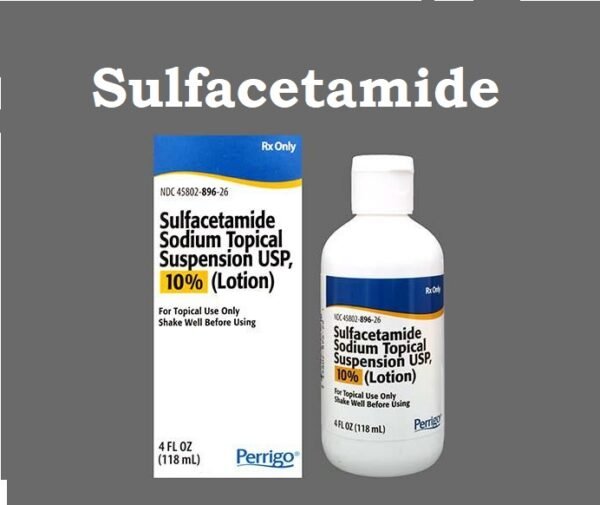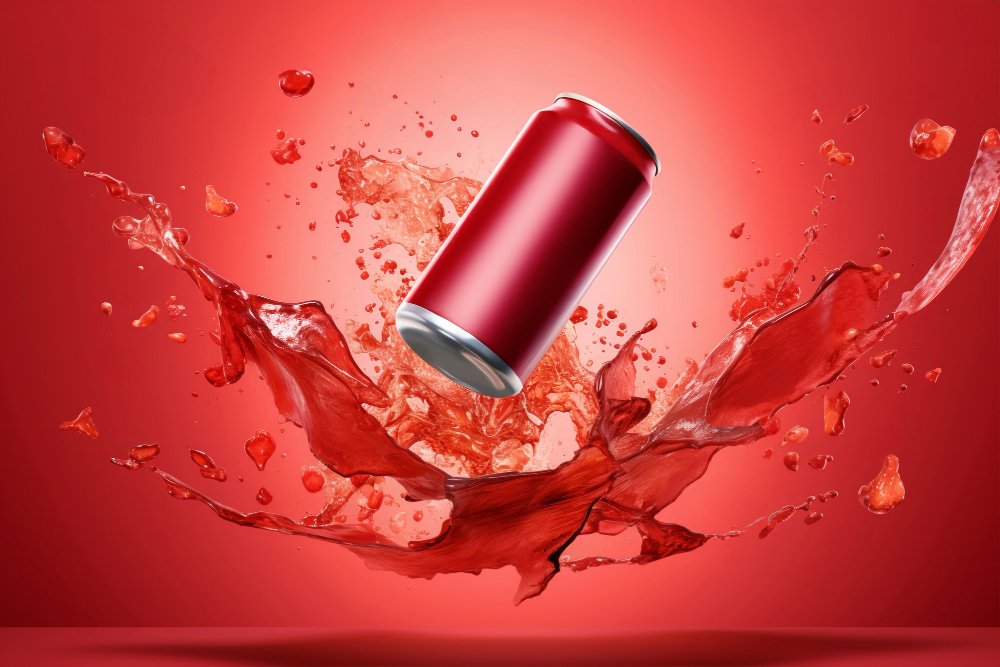Sulfacetamide is a sulfonamide antibiotic that is used alone or combined with other medicines for the treatment of cutaneous and ocular conditions.
Sulfacetamide Uses:
-
Acne (Klaron lotion, topical suspension):
- Treatment of acne vulgaris.
-
Bacterial infections (cream, wash, Ovace Plus lotion and foam):
- Treatment of bacterial infections of the skin.
-
Scaling dermatoses (cream, shampoo, wash, Ovace Plus lotion and foam):
- Treatment of scaling dermatoses (seborrheic dermatitis and seborrhea sicca [dandruff]).
It is also used in combination with prednisolone as eye ointment (Blephamide) and suspension for ocular inflammatory conditions.
Sulfacetamide Dose in Adults
Topical Sulfacetamide Dose in the treatment of Acne:
-
Klaron lotion, topical suspension:
- Apply a thin film to affected area twice per day.
Topical Sulfacetamide Dose in the treatment of bacterial infections:
-
Cream, Ovace Plus lotion:
- do Apply to affected areas twice per day for 8 to 10 days.
-
Foam:
- Apply to affected areas 1 to 3 times per day
-
Wash:
- Apply to affected areas 1 to 2 times daily for 8 to 10 days.
Topical Sulfacetamide use in patients with Scaling dermatoses:
-
Cream, Ovace Plus lotion:
- Apply to affected areas twice daily for 8 to 10 days.
- Dosing interval may be lengthened as eruption subsides.
- Applications once or twice weekly, or every other week may be used for prevention.
- If treatment needs to be reinitiated, start therapy as a twice-daily regimen.
-
Foam:
- Apply to affected areas 1 to 3 times per day
-
Shampoo:
- Wash hair at least twice weekly.
-
Wash:
-
Ovace Plus Wash Liquid, Ovace Plus Wash cleansing gel, Ovace wash:
- Wash affected areas twice with a 10- to 20-second interval between washings;
- repeat twice daily for 8 to 10 days.
- Dosing interval may be lengthened as eruption subsides.
- Applications once or twice weekly, or every other week may be used for prevention.
- If treatment needs to be reinitiated, start therapy as a twice-daily regimen.
-
SEB-Prev:
- Wash affected areas twice daily for 8 to 10 days.
- Dosing interval may be lengthened as eruption subsides.
- Applications once or twice weekly, or every other week may be used for prevention.
- If treatment needs to be reinitiated, start therapy as a twice-daily regimen.
-
Sulfacetamide Dose in Childrens
Sulfacetamide Dose in the treatment of Acne:
-
Children ≥12 years and Adolescents:
-
Topical: Lotion 10%:
- Apply a thin film to the affected area twice per day
-
Sulfacetamide use in the treatment of Seborrheic dermatitis, including seborrhea sicca:
Children ≥12 years and Adolescents: Topical:
-
Cream, Lotion 9.8%:
- Apply to affected areas twice daily for 8 to 10 days.
- Dosing interval may be lengthened as eruption subsides.
- Applications once or twice weekly, or every other week may be used for prevention.
- If treatment needs to be reinitiated, start therapy as a twice-daily regimen.
-
Foam:
- Apply to affected areas 1 to 3 times per day
-
Gel, Wash:
- Wash affected area twice with a 10- to 20-second interval between washings;
- repeat application twice per day for 8 to 10 days.
- Dosing interval may be lengthened as eruption subsides.
- Applications once or twice weekly, or every other week may be used for prevention.
- If treatment needs to be reinitiated, start therapy as a twice-daily regimen.
-
Shampoo:
- Wash hair at least twice weekly
Sulfacetamide Dose in the treatment of Secondary Cutaneous Bacterial infections:
-
Children ≥12 years and Adolescents: Topical:
-
Cream, Lotion 9.8%:
- Apply to affected areas twice per day for 8 to 10 days
-
Foam:
- Apply to affected areas 1 to 3 times per day
-
Gel:
- Wash affected area once a day for 8 to 10 days
-
Wash:
- Wash affected area once or twice a day for 8 to 10 days
-
Pregnancy Risk Factor C
- Studies on animal reproduction have not been done.
- It is unknown how much sulfacetamide is available in the body after topical application.
- Systemic sulfonamides may cause kernicterus in the baby if they are taken during pregnancy.
Sulfacetamide use during breastfeeding:
- Breast milk excretes small amounts of sulfonamides taken orally. It is not known whether sulfacetamide topically excreted in breastmilk.
- Breast-feeding with systemic sulfonamides can cause kernicterus in newborns.
Sulfacetamide Dose in Kidney impairment:
Not mentioned in the manufacturer's labeling.
Sulfacetamide Dose in liver disease:
Not mentioned in the manufacturer's labeling.
Side effects of Sulfacetamide:
-
Dermatologic:
- Burning Sensation Of Skin
- Erythema
- Pruritus
- Stevens-Johnson Syndrome
- Stinging Of The Skin
- Toxic Epidermal Necrolysis
-
Hematologic & Oncologic:
- Agranulocytosis
- Aplastic Anemia
- Hematologic Abnormality
-
Hepatic:
- Fulminant Hepatic Necrosis
-
Hypersensitivity:
- Hypersensitivity Reaction
-
Local:
- Local Irritation
- Localized Edema
-
Neuromuscular & Skeletal:
- Systemic Lupus Erythematosus
Contraindications to Sulfacetamide:
- Hypersensitivity known or suspected to sulfonamides, or any component of the formulation
- Kidney disease (Ovace Plus wash, Ovace Plus lotion and Ovace Plus foam).
Notice:
- Although the FDA approved product labeling has claimed that this medication is contraindicated/not indicated with other sulfonamide-containing drug groups, the scientific basis of this statement has been challenged.
- See "Warnings/Precautions" for more detail.
Warnings and precautions
-
Autoimmune effects:
- Sulfonamides have been linked to severe reactions such as drug-induced systemic Lupus Erythematosus.
-
Blood dyscrasias:
- Sulfonamides have been linked to severe reactions such as agranulocytosis and acute hemolytic anemia.
-
Dermatologic reactions
- Sulfonamides have been linked to severe reactions such as Stevens-Johnson Syndrome, toxic epidermal necrolysis and drug fever.
- Additionally, contact dermatitis and reddening of the skin can occur.
-
Hepatic effects
- Sulfonamides have been linked to severe reactions that include jaundice and fulminant liver necrosis.
-
Hypersensitivity reactions
- Patients who have never had sulfonamide hypersensitivity before may experience skin rash or other reactions.
- Stop using the medication immediately if you feel hypersensitive or rash.
-
Allergy to sulfonamide ("sulfa")
- Cross-reactivity concerns have been a concern for all compounds with the sulfonamide structural (SO NH).
- A deeper understanding of allergic mechanisms suggests that cross-reactivity between non-antibiotic and antibiotic sulfonamides is unlikely.
- Particularly, anaphylaxis (anaphylaxis) is unlikely to occur when 2 2 antibiotic sulfonamides or antibiotics sulfonamides are combined.
- Sulfasalazine is an antibiotic sulfonamide that has an arylamine structure. It may cross-react with antibiotic sulfonamides.
- T-cell-mediated reactions, i.e. type IV reactions, eg. the maculopapular skin rash are less understood. It is difficult to exclude this possibility based on current knowledge.
- Some clinicians prefer to avoid drug exposure in cases of severe reactions (Stevens Johnson syndrome/TEN).
-
Systemic effects
- Application to infected, abraded or burnt skin can increase systemic absorption.
Sulfacetamide (topical): Drug Interaction
|
BCG Vaccine (Immunization) |
Antibiotics may reduce the BCG vaccine's therapeutic effect (Immunization). |
|
Sodium Picosulfate |
Antibiotics may reduce Sodium Picosulfate's therapeutic impact. Management: If a patient previously used or is currently using an antibiotic, think about utilising an alternative product for bowel cleansing prior to a colonoscopy. |
|
BCG (Intravesical) |
Antibiotics may lessen BCG's therapeutic effects (Intravesical). |
Monitoring parameters:
- Response to therapy,
- signs of local irritation and/or sensitization, especially during long-term therapy.
How to administer Sulfacetamide?
-
Topical:
- Avoid contact with eyes and mucous membranes.
-
Foam:
- Clean affected skin thoroughly and pat dry prior to each application.
- Shake well prior to use.
- Dispense into palm of the hand. Massage into affected areas and wait 10 minutes; rinse thoroughly with water and pat dry.
-
Lotion and topical suspension:
- Shake well prior to use.
-
Shampoo:
- Apply to wet hair and massage vigorously into the scalp; thoroughly rinse hair.
-
Wash:
- Apply to wet skin and massage into a full lather, rinse thoroughly with plain water, and pat dry.
- If skin dryness occurs, rinse off early or use less frequently.
- When used for scaling dermatitis, regular shampooing after use is not necessary;
- however, hair should be shampooed at least once a week.
Mechanism of action of Sulfacetamide:
- Interferes in bacterial growth through inhibition of bacterial folic acids synthesis by competitive antagonism with PABA
Absorption:
- Significant absorption through the skin has been reported; percutaneous absorption about 4%.
Metabolism:
- Sulfanilamide (major metabolite)
Half-life elimination:
- 7 to 13 hours
Excretion:
- Urine 0.08% to 0.33%
International Brands of Sulfacetamide:
- Klaron
- Ovace Plus
- Ovace Plus Wash
- Ovace Wash
- Seb-Prev Wash
- Sodium Sulfacetamide Wash
Sulfacetamide Brand Names in Pakistan:
No Brands Available in Pakistan.




